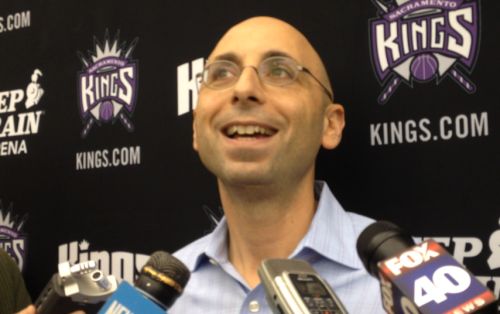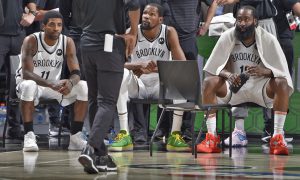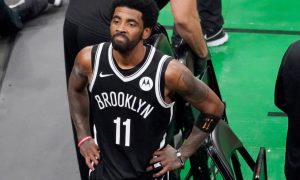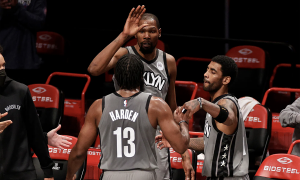With regards to the ownership of professional basketball franchises, the trade deadline poses a haphazard influence on the NBA in its entirety, pushing teams to make whatever moves necessary to ensure the organization will be formidable for a considerable span of time.
In Sacramento’s case, even with the distinguishable lack of a competitive front office which the Kings have shown in years past, this trade deadline has made one thing perfectly clear: Sacramento, to the fullest extent possible, has playoff aspirations for the future. It certainly won’t be this year, it may not be next year, and it may take more time than any Kings fan is willing to wait. But the Sacramento Kings front office is now more willing than ever to put the money and pieces to make a halfway decent basketball team, with a hope for stable, long-term success.
With the trade deadline for the 2013-14 season rapidly closing in, the potential for possible Kings moves was evident. Their most recent move has huge implications on the administration of minutes, players’ roles and the look of Sacramento moving forward.
As of today, Jason Terry and Reggie Evans are Sacramento Kings. Marcus Thornton, on the other hand, will be making his way to New York to play with Jason Kidd and the Brooklyn Nets.
It’s no surprise that Thornton was the one to go at the trade deadline. Without much more than a few heat-check games and some decent three-point production, Thornton had little to offer Michael Malone’s squad. Even in the Kings’ current shooting guard situation, a position filled with doubt and uncertain expectations, Thornton was an obvious filler whenever he entered a game, providing no means of consistency or measurable output. He was, in all senses of the word, lingering. He was just there to fill out a spot, and his move to Brooklyn will likely prove successful for a lineup which just needed something more out of a backup shooting guard.
As for the Kings’ shooting guard spot, it appears that placing full trust and understanding in Ben McLemore will be the route most beneficial for the Kings, as long-term success has been made an evident factor in the decision making process. Regarding McLemore’s minutes for the remaining 29 games of the regular season, Malone said he wants the rookie to “go out there with no pressure on him to show what he’s capable of doing.”
Whether or not full trust in McLemore will be beneficial for the Kings, Malone is justified in the sense that it can’t hurt to show some faith in a rookie who is struggling to find his niche in the NBA. However, something is very certain: Ben McLemore has one of the most complete athletic packages out of any player in the rookie class, and hands down the best shooting mechanics of any rookie. He has all the potential to be great, and if all he needs is a big opportunity to take the next step, Malone has made it clear that he’s got it.
This was quite possibly the deciding factor in giving up Thornton. Terry is a natural sixth man. He is a player who thrives off the bench as only a few rare ones do. His catch-and-shoot ability has never been overly impressive, but the consistency with which he knocks down open jumpers has all the makings of a second-unit shooting guard. That’s why he fits so well with this deal. To give McLemore the opportunity to become a thriving player in the NBA, he needed Thornton gone, especially with Thornton eating at McLemore’s minutes. The rookie was never given a solid stretch of 25-minute games to improve his ability. With Terry in the picture to back up the rookie, McLemore’s 23.3 minutes per game could rise to upwards of 30, giving him all the opportunity needed to become what is so scarce in this league: a good shooting guard.
In the past 10 games, McLemore has been given just over 21 minutes on average. So, given the assumption that Malone will give his rookie the full benefits of a starter, the 30-plus minutes that McLemore could potentially see will mean double-digit scoring and opportunities to improve his 36 percent shooting from the field.
There have been rumors of a possible buyout between Terry and the Kings, but if he stick with the team, Terry needs to understand his role as a backup for McLemore. It won’t likely be a problem to get Terry to buy into the rotation at the 2-guard position, as his natural role-player potential is what’s given him such an extensive career in the NBA. For the time being, the shooting guard position is set around McLemore. Except for one thing: Jimmer Fredette’s entire role on this team has been lost.
The 11 minutes per game Fredette has played have come at both guard positions, as a primary ball handler, as an off-ball shooter, and simply as a player meant to fill space.
What Fredette hasn’t had this season is any sort of consistency with regards to minutes and that’s a shame. Even with the overly speculated career Fredette has had as a Sacramento King, one thing is absolute: Fredette’s game, as well as his production, is improving before our eyes.
As of late, Fredette has been flat out impressive.
It may be that the second unit for Sacramento features a slew of non-scorers, providing Jimmer with all the go-ahead he needs to take the scoring load away from other bench players, but one can’t deny the production he’s been showing. In this streak of games, Jimmer has averaged seven points in just 12 minutes, a more than solid number for any backup guard. Even if he splits the minutes with the starting McLemore, a mere 18 minutes per game for Fredette would translate to 10.5 points per game. Regardless of whether or not Malone sees Fredette’s recent rise in production as legitimate, his upside cannot be ignored.
Getting past the scramble for stability at the shooting guard position, the arrival of Reggie Evans to Sacramento brings a much needed revelation of depth to the Kings’ power forward position.
The Kings have picked up a Reggie Evans contract which will cost the organization $3.4 million over the next two years and add a third piece to complement Quincy Acy and Jason Thompson at the power forward position.
The move was made for one of two reasons. Either the Kings front office wants Evans to provide some reassurance at the power forward spot so that they can send Jason Thompson packing, or a lacking second unit will feature a split of minutes between Acy and Evans.
Regardless of what purpose Evans is meant to serve in Sacramento, the lack of talent at this team’s power forward position is obvious. Six-and-a-half rebounds for a starting power forward in the NBA, even on a poor rebounding team like the Kings, is not a winning formula. Thompson can not be the solution that Sacramento depends on if the team hopes to have any edge in an impossibly good Western Conference. More than anything, a Sacramento Kings starting frontcourt, which features one of the best rebounders in the league in DeMarcus Cousins, needs another rebounder, especially on the offensive side of the ball.
In just 13 minutes per game, Evans’ five rebounds suggest the possibility of some huge rebounding production. If Malone does indeed decide to give Evans a starter’s role over Thompson, he will likely see just over 25 minutes per game. This could translate to double-digit rebounding for Evans, immediately propelling him to a top-20 rebounder in the NBA. It’s not to say that Malone will definitely start Evans, but the possibility of having a player who grabs over 10 boards in just 25 minutes of action is a positive.
Jason Thompson’s starting role is not set in stone. With Evans comes competition. In watching Thompson play, I get the sense that he’s too comfortable in his starting role, not making an effort to prove to his team that he could become better and become a force in the paint. With a solid rebounder in Evans, the sense of competition between the two for a starting spot is there. It’s a competition that is an absolute necessity in every locker room; it keeps players humble, giving them reason to force themselves to become better.
Jason Thompson needs it, and Reggie Evans delivers it.
The move for Terry and Evans is clearly a long-term one. Any fan who thinks the team is trying to make as many moves as possible, as soon as possible, has a deeply flawed understanding of what it takes to be a playoff franchise. The Sacramento Kings front office wants success for the future. Development of young players like McLemore and Cousins is the future of this franchise. Whether or not any of these players will have continuous contracted years with the team is up in the air, but playoff expectations are on the horizon.



















